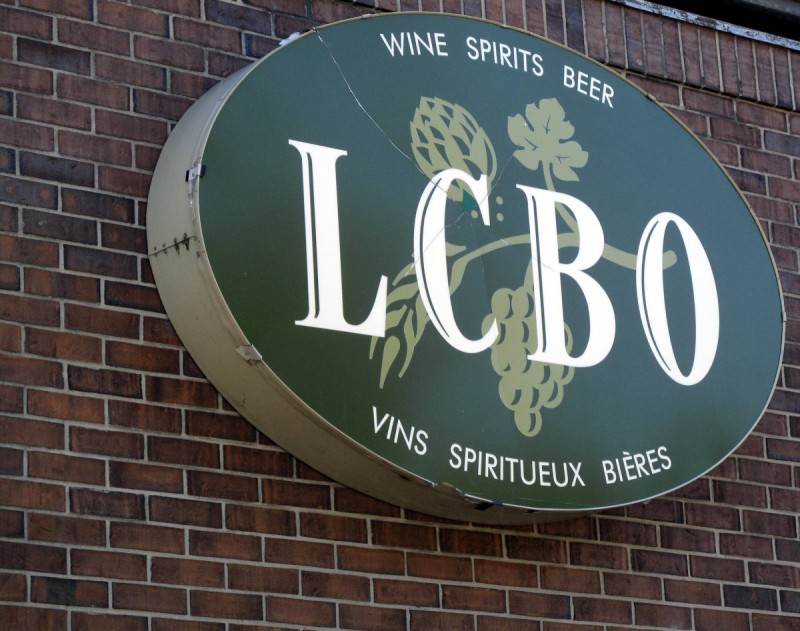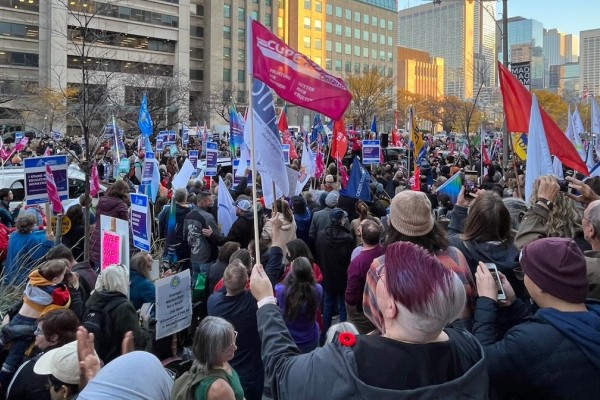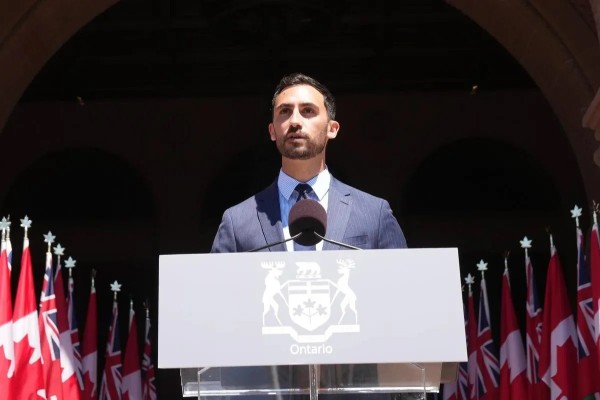LCBO strike is also about public health
Alcohol use produces an estimated $6.3 billion in health care costs every year in Canada

Photo by Douglas Sprott/Flickr
More than 9,000 unionized workers of the Liquor Control Board of Ontario (LCBO) have been on strike for almost two weeks against Premier Doug Ford’s privatization and union-busting campaign. Rather than return to the bargaining table in anything approaching good faith, Ford has continually attacked the Ontario Public Services Employee Union (OPSEU) and its members, most notably publishing an online map of non-union alcohol retailers open during the strike and further accelerating the plan to significantly expand alcohol availability at grocery and convenience stores.
As bargaining team chair Colleen MacLeod put it: “Instead of bargaining in good faith with the union and revisiting public policy that’s flat-out bad for Ontario, Doug Ford is only focused on pushing his harmful agenda—he can’t be trusted.” Similarly, OPSEU President JP Hornick emphasized: “The premier needs to stop interfering with our members’ right to bargain and stop escalating his destruction of public alcohol sales. Our members saw that their employer was directed never to bargain with them at the table.” And after “taking a wrecking ball to the walls of the bargaining unit” and repeatedly heightening tensions, Ford still has the gall to blame OPSEU for the lack of progress on bargaining.
Alcohol privatization has been underway in Ontario for many decades. The privately owned Beer Store was created in the same year as the LCBO to manage post-prohibition beer sales, and is today owned by AB InBev’s Labatt, Molson Coors, and Sapporo. Private “agency stores” have also been licensed by the LCBO since the early 1960s, at the time representing a “radical departure in Government liquor selling,” to increase alcohol retail access in rural communities. These realities are often invoked to downplay the threat of further expansion of private retailers.
Yet agency stores have clearly been used in recent years as a piecemeal privatization tool, with their number doubled to almost 200 in 2006 and again to almost 400 by the Ford government. In 2014, OPSEU opposed this trend with a boycott campaign and call for the LCBO to “repatriate” the 100 largest. As noted by Randy Robinson of CCPA Ontario, the addition of as many as 8,500 private alcohol retailers to the more than 2,300 that currently exist is a major escalation that will “have a profound effect on sales at the LCBO.” So far, the privatization opportunity has overwhelmingly been taken up by convenience stores, with more than 3,000 licenses already issued. The lack of interest by grocery stores so far appears to be linked to recycling requirements, which grocery lobbyists are pushing to have changed. On the whole, Ford’s plan has been described by two alcohol policy experts as the “most substantial alcohol deregulation policy in Canada in decades.”
The case for the strike and rolling back the privatization agenda has been expertly articulated by OPSEU and its supporters. In contrast to right-wing mythology of increased convenience and affordability, the rhetorical focus of working class opposition has been on the actual beneficiaries of Ford’s agenda: large corporations and chains like Loblaws, Circle K, Walmart, and 7-Eleven. This criticism has been proven entirely correct in the capitalist counter-attack during the strike, with powerful lobby groups like Restaurants Canada exercising significant sway over major policy decisions.
It’s also been effectively argued that further alcohol retail privatization will lead to the sizeable loss of income and viability of the more than 680 LCBO stores, massive revenues used for funding public services like health care and education, and decent unionized work. Against this dire trajectory, OPSEU is smartly demanding an expansion of the LCBO and more permanent jobs, with 70 percent of the workforce currently casualized. As Peter Hogarth wrote in Spring: “This is a fight for good public services and decent work in the province.”
Yet an important piece of the anti-privatization struggle has been almost entirely omitted from progressive discourse: the impact of increased alcohol consumption on public health. Other than a brief mention of “declining public health” by Hogarth in Spring and the Ontario Nurses’ Association noting that “it is the interest of public health to have alcohol sales publicly controlled and delivered,” there’s been no real acknowledgement that alcohol is a substance that kills more than 6,000 people in Ontario every year, and an estimated 2.6 million people worldwide in 2019. This is an urgent reality that alcohol companies and their political advocates like Ford have struggled tirelessly to conceal, continually undermining scientific and public health findings in order to defend their profits.
Alcohol use produces an estimated $6.3 billion in health care costs every year in Canada, playing a major role in the country’s growing “alcohol deficit,” in which the social costs of alcohol use are compared to government revenues from its sale. Ironically, the regular mentions of the use of LCBO revenues to fund health care and hospitals has not been connected to the more than 250 hospitalizations that occur in Canada every day entirely due to alcohol consumption (like alcohol use disorder, liver cirrhosis, and withdrawal) which doesn’t include the many more that are partially attributed to drinking, such as at least seven types of cancer, car crashes, and heart disease. Critics of Ford’s plan have routinely identified health care investments as a far better use of public funding than the $225 million in corporate subsidies to the Beer Store, but have yet to connect the dots with the health impacts of alcohol itself.
Of course, this particular angle is undoubtedly an unpopular one for some, and it’s understandable that the union may not want to front-load it in their public messaging. However, OPSEU has actually pointed out this aspect before, with its 2014 criticism of agency stores noting that “drinking is extremely popular, but there’s a cost attached to it,” and that “we think the LCBO model of public ownership is still the best way to minimize the net cost to society of alcohol.” But the alcohol industry and its army of lobby groups has waged a highly effective campaign in recent years to slander any criticism of their activities as inherently prohibitionist, possibly contributing to the reluctance of many people otherwise concerned with public health to avoid the issue.
Did you know that LCBO workers are crucial to building a better Ontario?
— OPSEU (@OPSEU) July 5, 2024
Funds from public alcohol sales ensure good health care, education, and jobs across the province!
That’s why LCBO workers are striking NOW for a better FUTURE.
Show your support at https://t.co/wa1ik4vrBs pic.twitter.com/RP9vspy7NH
This means that health care organizations and experts have been left to make this case where and when they can. The head of the Canadian Mental Health Association’s Ontario division described the proposed alcohol retail expansion as a “health care issue,” arguing that more consumption would inevitably lead to greater health and social consequences. The Centre for Addiction and Mental Health has warned that increased alcohol sales will “significantly increase” alcohol-related deaths in the province, and that “evidence shows that the expansion of alcohol availability, especially through private retail outlets, results in increased consumption and ultimately more alcohol-attributable hospitalizations, diseases, and deaths.” One of the major recommendations made last year by the Ontario Public Health Association to reduce alcohol’s health impacts was to “stop further privatization of alcohol sales.”
The prominent involvement of public health interests in this push is obvious and intuitive, as are their policy recommendations such as mandatory warning labels and restricted advertising. But it’s important that the political left picks up and deepens these critiques, as well. Protecting public ownership of alcohol retail is not only essential for jobs and government revenue; it’s also vital in the fight for defending and improving public health, and deserves to be linked to adjacent issues such as the ongoing toxic drug poisoning crisis, particularly given the tremendous overlaps possible with a radical politics of harm reduction.
The left also has an excellent opportunity to use this moment as an opportunity to advocate for a vision of society that includes more ways for people to relax and socialize than only drinking, including a huge expansion of public spaces and decommodified amenities, dreaming up non-alcocentric venues and places to hang out, and legalization and regulation of other drugs.
Reducing alcohol harms is about recognizing that risk exposure exists on a spectrum, with even marginally less regular consumption leading to significant health improvements. Conversely, further unleashing the rapacious forces of capital through this massive privatization scheme will only increase alcohol consumption and resulting harms. More working class people will die, get sick, and be injured in order to generate profits for capitalists. And, yes, the provincial government will have even less revenue to fund the health care necessary to respond to it.
While the existing iteration of the LCBO is far from perfect—long weakened and leveraged by governments to maximize revenues for their own sake—it offers the potential for collective power to continue being built for a world of less harm and greater pleasure. Seized away from the profit motive, and positioned as a vital institution for working class health and joy, the LCBO could integrate and network with a much wider range of opportunities: publicly-owned venues that offer many forms of entertainment, different and often less-risky psychoactive drugs, managed alcohol programs and peer support groups that don’t mandate or preach sobriety as a condition of participation. Along with helping curb alcohol harms and improving public health, such a transformation would produce many more good, unionized jobs.
This, too, should be a priority in our struggles against the Ford government’s onslaught. Show up for striking OPSEU workers and defend public alcohol sales: for jobs, revenues, and public health.
James Wilt is a Winnipeg-based PhD candidate and freelance writer. He is the author of Drinking Up the Revolution: How to Smash Big Alcohol and Reclaim Working-Class Joy (Repeater Books).










